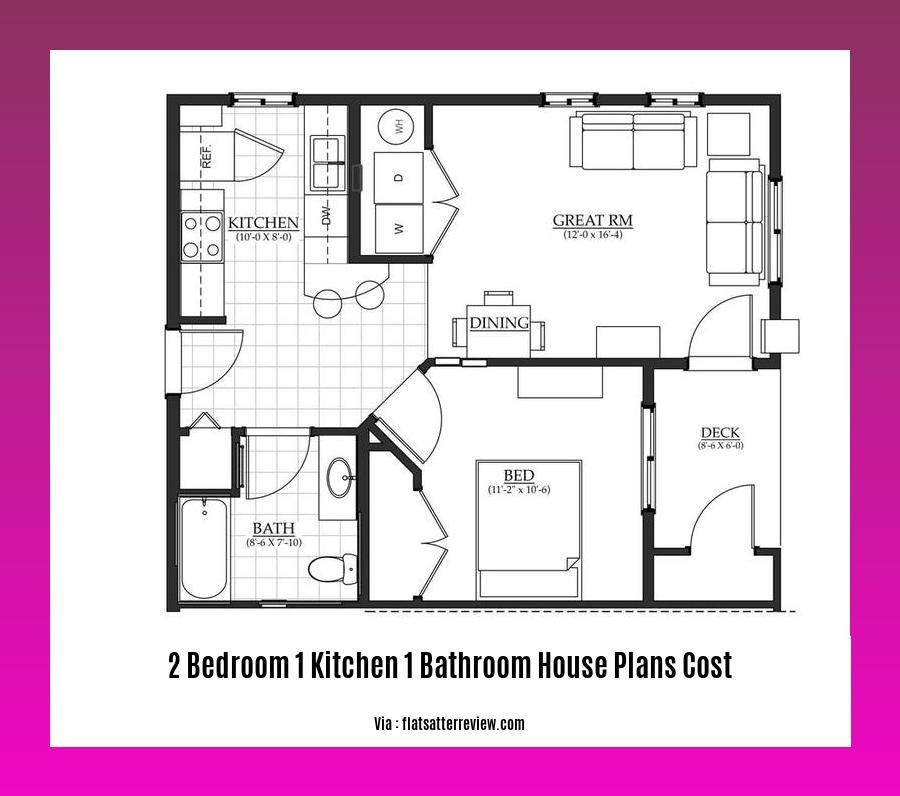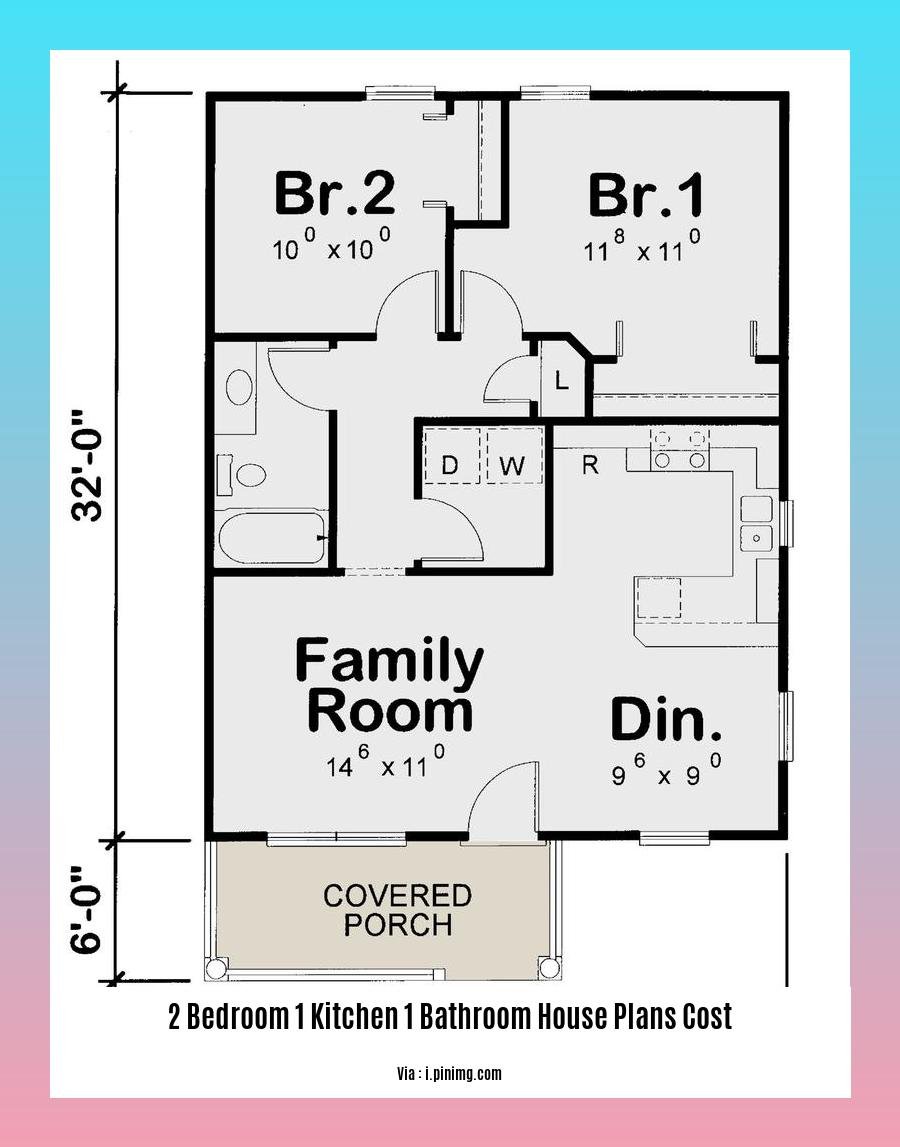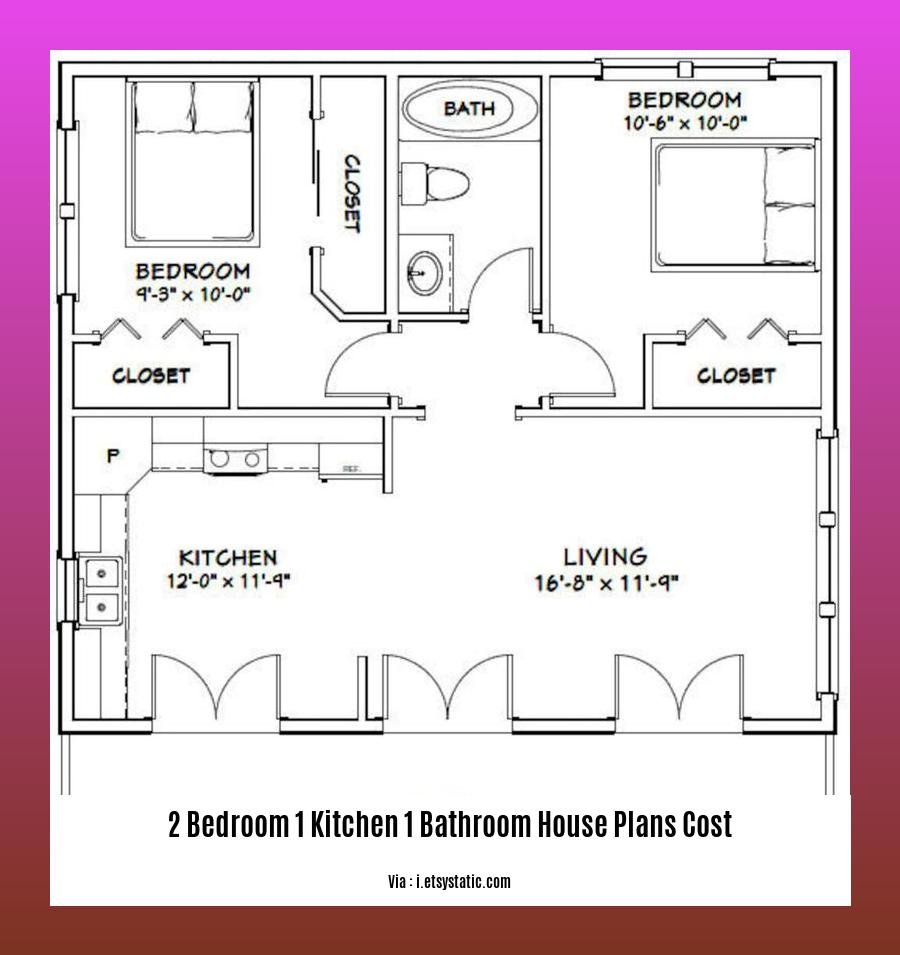In the realm of home construction, understanding the costs associated with building a 2 bedroom, 1 kitchen, 1 bathroom house is paramount for informed decision-making. “Unveiling the True Costs: A Guide to Building a 2 Bedroom, 1 Kitchen, 1 Bathroom House” delves into the intricacies of budgeting for such a project, providing valuable insights into the factors that influence construction expenses and empowering you to embark on your home-building journey with confidence.
Key Takeaways:
-
2-bedroom house plans are popularly chosen for their cost-effectiveness and compact size.
-
The versatility of these plans allows for the inclusion of a guest room, home office, or playroom, making them suitable for a wide range of homeowners.
-
For more information and inspiration, explore reputable websites such as Houseplans.com, The Plan Collection, and Southern Living, which offer a diverse collection of 2-bedroom house plans.
2 bedroom 1 kitchen 1 bathroom house plans cost

Building a home can be an exciting yet daunting task. Understanding the associated costs is crucial to planning and budgeting effectively. When it comes to constructing a two-bedroom, one-kitchen, one-bathroom house, several factors influence the overall expense.
Factors Affecting the Construction Costs
The cost of building a two-bedroom, one-kitchen, one-bathroom house can vary significantly depending on various factors. These include:
-
Building Materials: The choice of building materials plays a crucial role in determining the cost. Options such as brick, concrete, wood, and vinyl have varying expenses.
-
Labor Costs: Labor costs account for a significant portion of the construction budget. Hiring skilled workers, architects, and contractors can impact the overall expenditure.
-
Location: The geographical location where the house is being built can also affect the cost due to differences in labor rates, material availability, and building codes.
-
Size and Design: Larger homes with complex designs and additional features like garages or porches typically require a higher budget.
-
Permits and Approvals: Obtaining the necessary permits and approvals from local authorities can involve fees and associated costs.
Estimated Cost Breakdown
While the exact costs can vary, here’s an approximate breakdown of the expenses involved in building a two-bedroom, one-kitchen, one-bathroom house:
| Cost Component | Typical Range |
|---|---|
| Land Acquisition | $25,000 – $250,000 |
| Architectural and Engineering Fees | $2,000 – $10,000 |
| Building Permits | $1,000 – $5,000 |
| Materials and Supplies | $50,000 – $150,000 |
| Labor Costs (including subcontracting) | $30,000 – $90,000 |
| Interior Finishes (cabinets, countertops, flooring) | $10,000 – $30,000 |
| Utilities (electrical, plumbing, HVAC) | $10,000 – $30,000 |
| Contingency and Miscellaneous Expenses | $10,000 – $20,000 |
Cost-saving Tips
-
Smart Material Selection: Choose cost-effective yet durable materials without compromising quality.
-
DIY Tasks: Consider taking on certain tasks yourself to reduce labor costs, such as painting or landscaping.
-
Explore Pre-built Options: Prefabricated homes or modular construction can offer savings on materials and labor.
-
Optimize the Design: Opt for simpler designs with fewer complex features to minimize costs.
-
Shop Around: Compare quotes from multiple contractors to find the most competitive prices.
-
Consider Energy Efficiency: Investing in energy-efficient appliances and insulation can save money on utility bills in the long run.
Conclusion
Building a two-bedroom, one-kitchen, one-bathroom house can be a rewarding experience but requires careful planning and financial preparation. By understanding the factors influencing costs and exploring cost-saving strategies, you can create a beautiful and functional home within your budget.
In search of a well-equipped living space that blends comfort and functionality? Our 2 bedroom 1 bath apartment floor plans offer a perfect balance of style and convenience.
Seeking a cozy retreat surrounded by nature’s beauty? Explore our 2 bedroom 2 bath log cabin kits, meticulously designed to provide both comfort and a rustic charm.
For those who value mobility and style, our 2 bedroom 2 bath mobile home floor plans present a fantastic blend of affordability, functionality, and modern design.
Materials and Finishes: The type of materials used for construction, such as bricks, concrete, or wood, as well as the quality of finishes, like tiles or countertops, influence the overall cost.
Choosing the right materials and finishes is crucial for building a 2-bedroom, 1-kitchen, 1-bathroom house that fits your budget and style. Here are some key considerations:
1. Types of Finishes:
Flooring, concrete, and finishes like tiles, countertops, and paint contribute significantly to the overall cost.
a. Flooring Finishes:
Options range from budget-friendly vinyl or laminate to mid-range ceramic tiles or hardwood and high-end options like marble or granite. Consider durability, maintenance requirements, and your budget.
b. Concrete Finishes:
Smooth screed finishes are cost-effective, while polished concrete or stamped concrete with designs add style and durability at a higher cost.
c. Other Finishes:
Countertops, cabinets, and tiles offer various materials and styles. Natural stone, solid quartz, or laminate countertops vary in cost and durability. Cabinetry materials range from wood to thermofoil, impacting the overall cost.
2. Types of Bricks:
Bricks are a popular choice for exterior walls, and their cost depends on type and quality.
a. Clay Bricks:
Traditional fired bricks offer durability and fire resistance but can be more expensive than concrete blocks.
b. Concrete Blocks:
Concrete blocks are a cost-effective alternative to clay bricks, providing strength and moisture resistance.
c. Other Factors:
Factors like brick size, color, and texture also influence the cost.
Key Takeaways:
- Finishes like flooring, concrete, and tiles significantly impact the overall cost.
- Consider durability, maintenance, and budget when selecting finishes.
- Type of bricks, whether clay or concrete, affects the cost.
- Factors like brick size, color, and texture influence the overall cost.
Sources:
Site Preparation and Foundation: Factors That Impact Construction Costs

Have you dreamt of building your own two-bedroom, one-kitchen, one-bathroom house? While the excitement of designing your dream home is undeniable, it’s crucial to understand the financial implications before you embark on this journey. Let’s delve into one of the initial and often overlooked aspects that can significantly influence your budget – site preparation and foundation work.
Key Takeaways:
-
Proper preparation is key: Careful planning and preparation of the construction site can save time and money in the long run.
-
Soil conditions matter: The type of soil on your building site can have a significant impact on the cost of your foundation. Soil that is soft or unstable may require additional work, such as soil compaction or the installation of a deeper foundation.
-
Slope can be a challenge: If your building site is on a slope, you may need to level the land before construction can begin. This can add to the cost of site preparation.
-
Foundation choices: The type of foundation you choose will also affect the cost of your home. There are several different types of foundations to choose from, and the best option for you will depend on the soil conditions, the size of your home, and your budget.
-
Expert advice is valuable: Consulting with a qualified contractor or engineer can help you assess the specific factors that will impact the cost of site preparation and foundation work on your building site.
Essential Steps for Site Preparation
-
Soil Report: Conduct a soil test to assess the soil conditions on your building site. This report will help determine the type of foundation you need and any additional work that may be required.
-
Demolition and Clearing: If there are existing structures or vegetation on the site, they will need to be removed. This includes clearing the land of trees, shrubs, and other debris.
-
Excavation: The site will need to be excavated to the proper depth for the foundation. The depth of the excavation will depend on the type of foundation you choose.
-
Leveling and Compacting: The excavated area will need to be leveled and compacted to provide a solid base for the foundation. This may require the use of heavy equipment.
-
Foundation Installation: Once the site is prepared, the foundation can be installed. The type of foundation you choose will depend on the soil conditions and the size of your home.
-
Anti-Termite Treatment: To protect your home from termite damage, it’s important to have the site treated with an anti-termite solution before the foundation is installed.
Conclusion
Site preparation and foundation work are essential steps in the construction of any home. By understanding the factors that can affect the cost of these processes, you can make informed decisions about your budget and ensure that your dream home is built on a solid foundation. Remember, consulting with a qualified contractor or engineer can provide valuable insights and help you navigate the complexities of site preparation and foundation work. Remember, the success of your building project hinges on a solid groundwork, so don’t underestimate the importance of site preparation and foundation!
Citations:
- Site Preparation and Foundation
- Factors That Affect the Cost of Site Preparation and Foundation Work
Additional Features: Incorporating specific features like garages, decks, or energy-efficient systems can further increase the total cost of the project.
Homeowners can personalize their dream homes by incorporating distinctive features that align with their lifestyle and preferences. However, it’s crucial to recognize that these enhancements often come with an additional cost. Let’s delve into some of the most common features that can impact your budget:
Garages:
A garage not only provides shelter for vehicles but also serves as a versatile space for storage or even a workshop. Depending on the size, materials, and complexity of the design, a garage can add anywhere from $10,000 to $40,000 to the overall cost.
Decks:
Decks are a fantastic way to extend living spaces outdoors, offering a tranquil spot for relaxation or entertaining guests. The cost of a deck can vary greatly based on the materials used, size, and any additional features like built-in seating or railings. Expect to allocate around $15,000 to $30,000 for a well-crafted deck.
Energy-Efficient Systems:
Incorporating energy-efficient features into your home can not only reduce your carbon footprint but also save money on utility bills in the long run. Investing in energy-efficient appliances, insulation, windows, and lighting can collectively add $5,000 to $15,000 to the total cost of your home construction.
Finishes and Materials:
The selection of finishes and materials significantly influences the overall cost of construction. Opting for high-end finishes like granite countertops, hardwood floors, and designer tiles will elevate the budget compared to more economical alternatives.
Customizations:
Unique design elements and customizations can add a personal touch to your home but often come at a price. Custom cabinetry, intricate moldings, or a curved staircase are just a few examples of features that can increase the overall cost.
Key Takeaways:
- Garages, decks, and energy-efficient systems can significantly increase the cost of a home construction project.
- The cost of a garage can range from $10,000 to $40,000 depending on size, materials, and design.
- Decks can cost anywhere from $15,000 to $30,000, influenced by materials, size, and additional features.
- Energy-efficient systems, such as appliances, insulation, and windows, can add $5,000 to $15,000 to the total cost.
- Finishes and materials, as well as customizations, can further impact the overall budget.
Citations:
[1]
[2]
FAQ
Q1: What are the major factors that influence the cost of building a 2 bedroom, 1 kitchen, 1 bathroom house?
A1: The cost of building a 2 bedroom, 1 kitchen, 1 bathroom house can vary depending on several factors, including the size of the house, the materials used, the location of the property, and the labor costs in the area.
Q2: What are the average costs associated with building a 2 bedroom, 1 kitchen, 1 bathroom house?
A2: On average, the cost of building a 2 bedroom, 1 kitchen, 1 bathroom house can range from $100,000 to $250,000. However, it’s important to note that this is just a general estimate, and the actual cost may vary depending on the factors mentioned above.
Q3: What are some ways to save money when building a 2 bedroom, 1 kitchen, 1 bathroom house?
A3: There are several ways to save money when building a 2 bedroom, 1 kitchen, 1 bathroom house. Some cost-saving measures include choosing less expensive building materials, doing some of the work yourself, and negotiating with contractors for better rates.
Q4: What are some common mistakes to avoid when building a 2 bedroom, 1 kitchen, 1 bathroom house?
A4: Some common mistakes to avoid when building a 2 bedroom, 1 kitchen, 1 bathroom house include not getting the proper permits, not having a clear budget, and not hiring a qualified contractor.
Q5: What are some tips for choosing the right contractor for building a 2 bedroom, 1 kitchen, 1 bathroom house?
A5: When choosing a contractor for building a 2 bedroom, 1 kitchen, 1 bathroom house, it is important to consider their experience, reputation, and references. It is also important to get a written contract that outlines the scope of work, the timeline, and the payment terms.
- Are Daffodils Perennials?A Complete Guide to Planting & Care - March 31, 2025
- Are Carpenter Bees Dangerous? Stings, Damage, and Control - March 31, 2025
- How to Get Rid of Ants in the Washroom: A Complete Guide - March 31, 2025










